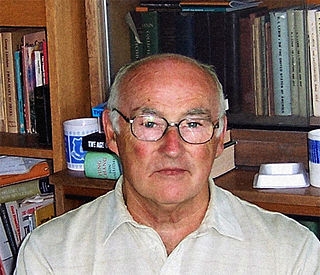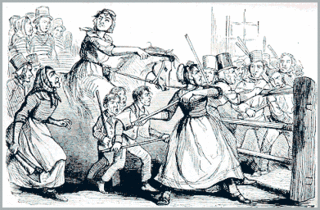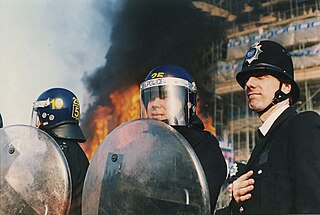Related Research Articles

The Solidarity Federation, also known by the abbreviation SolFed, is a federation of class struggle anarchists active in Britain. The organisation advocates a strategy of anarcho-syndicalism as a method of abolishing capitalism and the state, and describes itself as a "revolutionary union". In 1994 it adopted its current name, having previously been the Direct Action Movement since 1979, and before that the Syndicalist Workers' Federation since 1950.

The Community Charge, commonly known as the poll tax, was a system of taxation introduced in replacement of domestic rates in Scotland from 1989, prior to its introduction in England and Wales from 1990. It provided for a single flat-rate per-capita tax on every adult, at a rate set by the local authority. The charge was replaced by Council Tax in 1993, two years after its abolition was announced.

Peter Taaffe is a British Marxist political activist and journalist. He is the general secretary of the Socialist Party of England and Wales and member of the International Executive Committee of the refounded Committee for a Workers' International (CWI).

Referendums in the United Kingdom are occasionally held at a national, regional or local level. National referendums can be permitted by an Act of Parliament and regulated through the Political Parties, Elections and Referendums Act 2000, but they are by tradition extremely rare due to the principle of parliamentary sovereignty meaning that they cannot be constitutionally binding on either the Government or Parliament, although they usually have a persuasive political effect.

Ammon Ashford Hennacy was an American Christian pacifist, anarchist, social activist, member of the Catholic Worker Movement, and Wobbly. He established the Joe Hill House of Hospitality in Salt Lake City, Utah and practiced tax resistance.

The Rebecca Riots took place between 1839 and 1843 in West and Mid Wales. They were a series of protests undertaken by local farmers and agricultural workers in response to perceived unfair taxation. The rioters, often men dressed as women, took their actions against toll-gates, as they were tangible representations of high taxes and tolls. The riots ceased prior to 1844 due to several factors, including increased troop levels, a desire by the protestors to avoid violence and the appearance of criminal groups using the guise of the biblical character Rebecca for their own purposes. In 1844 a Parliamentary act to consolidate and amend the laws relating to turnpike trusts in Wales was passed.
Peacemakers was an American pacifist organization. The name of the group was taken from a section of the Bible, the Beatitudes or Sermon on the Mount: “Blessed are the peacemakers, for they will be called children of God.”

The poll tax riots were a series of riots in British towns and cities during protests against the Community Charge, introduced by the Conservative government of Prime Minister Margaret Thatcher. The largest protest occurred in central London on Saturday 31 March 1990, shortly before the tax was due to come into force in England and Wales.
Karl H. Meyer is an American pacifist, activist, Catholic Worker and tax resister. He is the son of William H. Meyer, a former member of the United States House of Representatives from Vermont. He is the founder of the Nashville Greenlands Catholic Worker community in Nashville, Tennessee. Meyer considers himself no longer a Catholic but now a Catholic Worker. He is quoted as once "trying to be an American Gandhi".
Hartal is a term in many Indian languages for a strike action and was used first during the Indian Independence Movement. A hartal is a mass protest, often involving a total shutdown of workplaces, offices, shops, and courts of law, and a form of civil disobedience similar to a labour strike. In addition to being a general strike, it involves the voluntary closing of schools and places of business. It is a mode of appealing to the sympathies of a government to reverse an unpopular or unacceptable decision. A hartal is often used for political reasons, for example by an opposition political party protesting against a governmental policy or action.

The Bardoli Satyagraha of 1928, in the state of Gujarat, India during the period of the British Raj, was a major episode of civil disobedience and revolt in the Indian Independence Movement. The movement was eventually led by Vallabhbhai Patel, and its success gave rise to Patel becoming one of the main leaders of the independence movement.
Northern California War Tax Resistance (NCWTR) is an activist group in the San Francisco bay area that promotes tax resistance as a way to protest against and/or disassociate from war and militarism. Despite the "Northern California" in the name, the group has a smaller, bay-area-specific focus, and there are other groups that serve war tax resisters in other parts of Northern California.

The Women's Tax Resistance League (WTRL) was from 1909 to 1918 a direct action group associated with the Women's Freedom League that used tax resistance to protest against the disenfranchisement of women during the British women's suffrage movement.
The Association of Real Estate Taxpayers (ARET) was an organization of real-estate taxpayers in Chicago and Cook County, Illinois. Between 1931 and 1933, it organized one of the largest tax strikes in American history. The group had been founded in 1930 by several wealthy real-estate owners.

Dorothy (Dora) Frances Montefiore was an English-Australian women's suffragist, socialist, poet, and autobiographer.
The All Britain Anti Poll Tax Federation, commonly known as "the Fed", was an organisation in Great Britain to co-ordinate the activities of local Anti-Poll Tax Unions (APTUs) campaigning against the Poll tax brought in by Margaret Thatcher's Conservative government in 1989 (Scotland) and 1990.

An Act of Conscience is a 1997 documentary film by Robbie Leppzer about the war tax resistance of Randy Kehler and Betsy Corner and years-long struggle that ensued after the IRS seized their home in Colrain, Massachusetts in 1989, to recover $27,000 in unpaid taxes, penalties, and interest. The film premiered at Sundance Film Festival and was shown on Cinemax and the Sundance Channel. It is narrated by Martin Sheen and features cameo appearances by activist-priest Daniel Berrigan and political folksinger Pete Seeger.

Addiopizzo is a grassroots movement established in Sicily to build a community of businesses and consumers who refuse to pay "pizzo" – Mafia extortion money. It is a grassroots social-conscience motivated consumer movement analogous to Fair Trade. The group, led by a generation whose adolescence was characterized by the murders of anti-Mafia judges, journalists and businessmen, operates in the Palermo and Catania metropolitan areas, traditionally Mafia strongholds.
John Evans was a colonial governor of Pennsylvania, 3 February 1704 through 1 February 1709. He was of Welsh origin, and in February 1704, became deputy governor of the province, under the proprietor, William Penn. He was not a Quaker, and was doubtless selected out of deference to the court party, who did not believe in the peace principles of that sect. His administration was marked by quarrels with the assembly, and especially with the speaker of the house, David Lloyd, who headed the popular party. Disregarding the convictions of the Quakers, Evans, for the first time in the history of the colony, made a public call for troops, with the desire of assisting the other colonies against the French and Indians. The call met with no response, whereupon the governor, resorting to a discreditable ruse, arranged to have a messenger ride into Philadelphia on the day of the annual fair, announcing, with apparent consternation, that the French had arrived in the Delaware and were marching on the city. Evans then rode through the street with drawn sword, entreating the people to arm, and for a time great excitement prevailed. Valuables were hastily thrown into wells, and many people fled to the forests; but the Quakers, on whom Evans had wished to make an impression, continued quietly at their devotions, as it was the day for their "weekly meeting." The governor also built a fort at Newcastle, and unlawfully demanded tribute of all vessels passing up the river. One of his tax enforcers was captured by a ship he had been trying to tax and carried off to the Jersey side of the river where a furious Lord Cornbury upbraided him, whereupon Evans gave up on his tax. Evans had a good deal of learning and refinement, but his habits were unsuited to the Quaker City. Watson, in his "Annals of Philadelphia," says that in 1702 "Solomon Cresson, going his round at night, entered a tavern to suppress a riotous assembly, and found there John Evans, Esq., the governor, who fell to beating Cresson." Evans was finally recalled in February 1709, and was succeeded by Colonel Charles Gookin.

The anti-austerity movement in the United Kingdom saw major demonstrations throughout 2011. While agreeing that the country faced a financial crisis, organisations including some UK trade unions, argued that the Conservative-Liberal Democrat coalition government was pushing deep spending cuts rapidly and without proper consultations or consideration for the impact on the public. They believed that most of the government cuts were designed to target the working class, while big businesses, and financial businesses, in particular businesses with connections to British MPs, were going unpunished whilst avoiding paying any tax, despite their perception that the latter was the main reason for the financial crisis and the subsequent recession.
References
- ↑ The day 250,000 warrants were issued over Glasgow’s refusal to pay poll tax, Glasgow Live, 15 January 2019
- ↑ Gross, David M. (2014). 99 Tactics of Successful Tax Resistance Campaigns. Picket Line Press. p. 33. ISBN 978-1490572741.
- ↑ Protests, law and order in the twentieth century page 145
- ↑ http://www.militant.org.uk/PollTax.html
- ↑ Gross, David M. (2014). 99 Tactics of Successful Tax Resistance Campaigns. Picket Line Press. pp. 77–78. ISBN 978-1490572741.